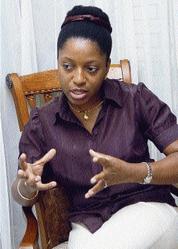Sacha Walters, Staff Reporter

Sherrone Lobban - Ricardo Makyn/Staff Photographer
Iraq, Sudan and Lebanon are more likely to be associated with the international segment of the news than thought of as countries where a Jamaican has made her mark doing humanitarian work.
Well, for Sherrone Blake Lobban, 33, they are all countries which she has made an impact through her work with the United Nations.
Mrs. Blake Lobban worked as a programme expert for the United Nations for the office of the Iraq Programme up to 2002, a member of the panel of experts concerning Sudan up to March 2006 and a member of the Lebanon Independent Border Assessment Team up to June of this year.
Coming from humble beginnings, she was always committed to service from her early days attending the Central Branch All-Age School where Brownies was her service club of choice. She attended HolyChildhood High and EXED Community College and was involved in other service clubs like Circle K. This would set the platform for her life's work.
After eight years at the Jamaica Customs Department, where among other duties she gathered intelligence for drug interdiction, she began pursuing a master's degree in development and management at the University of Manchester in the United Kingdom. With only four months to complete her studies, she was called by the U.N. for a job.
"When I was at customs, I had applied for a position at the U.N.," she said.
While doing her bachelor's in international relations at the University of the West Indies she always wanted to be a part of the decision-making nucleus which would effect change.
First post
Her first post entailed monitoring the Oil for Food Programme in Iraq. Established in 1995 by the UN, the Oil for Food Programme was designed to allow Iraq to trade oil for necessities like food and medicine to benefit the average national.
"We monitored the money to ensure it could not be used to purchase weapons of mass destruction," she said.
"I think I was the first and only Jamaican ever invited to be part of that team. At the time, I was the youngest person on the team and also I was the only person of African decent," she said.
"It got a bad rap because there were allegations about facilitating corruption, but the customs expert group (of which she was a part)was exonerated."
Although the programme was terminated prematurely because of the controversy, she believes it served the Iraqi people well.
"This is a programme which handled US$300 billion worth of food and supplies to the people of Iraq." She believes it would have been unlikely without the U.N.'s help.
Two other missions with the U.N. to Sudan and Lebanon would prove more dangerous.
"I was invited back by the U.N. to be a part of the panel of experts on Sudan. To date, this is probably one of my most interesting assignments. The one in Lebanon was the most dangerous," she said.
In both countries, she was a part of teams that were responsible for visiting these countries and writing reports which suggested possible solutions to their problems.
"I think I went to some of the most dangerous regions of Sudan because I visited the rebel stronghold. I was in Al Fashir, El Geneina, Nyala, I mean those are like the hard areas of Darfur. And during that time, many things were happening to international staff," she said at least two persons were killed.
Felt no fear

Sherrone Lobban has been to some of the most dangerous places in the world but does not travel in fear. - Ricardo Makyn/Staff Photographer
Fear was not part of her daily experience. The only time she really gave thought to her safety was when a Danish newspaper published 12 cartoons portraying the Muslim leader Mohammed in what Muslims perceived as a blasphemous manner and it caused tension all over the community.
"Our security detail changed and we had to drive in armoured vehicles."
While in Lebanon, she was approximately 10 minutes away from where a bomb went off.
"Ten persons died, two of them being a government official and his son. But that was a target hit and they went especially for him. During that time the security detail tightened."
After the incident, there were suggestions that detractors might be trying to delay the release of their report which was near completion.
"You find that with the stronger security detail you still have to be careful and still have to be cognisant that if somebody really wants to get you in that environment with suicide bombers etc., they can find a way."
Family first
While committed to her work, Mrs. Blake Lobban puts her family first. Married for three years, she said her husband has long realised she will never be the sit at home type.
However, while she has made sacrifices to accomplish her career goals, Mrs. Blake Lobban declined an offer for onemission so she could come home to support one of her three children, her daughter Shaneicia during her CSEC examinations.
Her faith has helped her through trying times. She said while she is not exclusive to a particular denomination, she never left her Bible, even when travelling in Muslim communities. Everyone would know she is a Christian and her faith in God brought her through her entire experience.
Back in Jamaica, Mrs. Blake Lobban co-founded Development Partners and Management International Limited, a development management consultancy in 2006.
She is chief executive officer and lead consultant for the company which offers project management, training and research services. They specialise in poverty reduction, governance and civil society, and trade and development. With her vast experience in making recommendations to solve problems in other countries, she believes that Jamaica, too, can benefit from some adjustments.
"You don't have true development if there isn't a reduction in crime," she said.
Not one to just join in issuing out rhetoric, Mrs. Blake Lobban will be pursuing her Ph.D. and focusing on possible solutions for some of Jamaica's problems.
Illegal activity
She said it's important to find rea for individuals for whom illegal activity is their job as many of the present solutions are 'band-aid remedies'.
She noted that in many cases in Jamaica, attempts are made to provide jobs through donations, but there is very little follow-up to make adjustments if necessary.
She said while Jamaica has come a long way with border control, there is still more to be done to prevent the infiltration of drugs and guns.
Mrs. Blake Lobban said, politicians should be willing to task a team which is solely responsible for creating solutions from the grassroots level, and Jamaicans must hold their politicians responsible for their promises.

